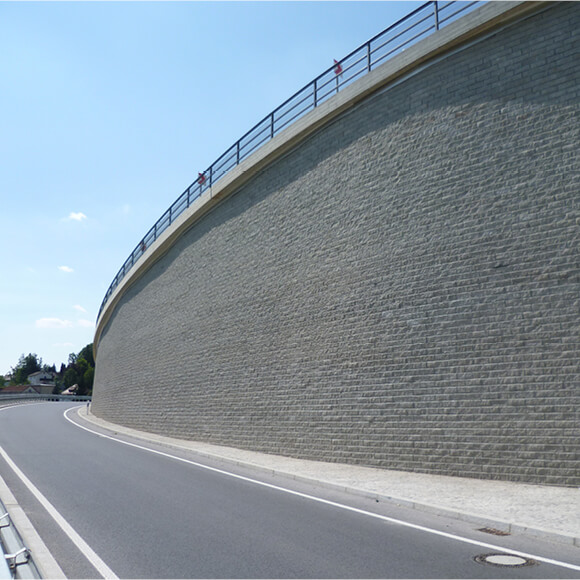.jpg?width=580&height=580&ext=.jpg)
Dubai Fujairah Freeway: United Arab Emirates
Construction in the arid conditions of the UAE means that concrete-based retaining walls can be problematic, with extensive curing time an issue. All fill for the walls was taken from the sections in cut local to the site. The indigenous rock is Gabbro, which is harder than granite and necessitates an extensive blasting operation, to remove over 9 million m2 of material. As well as minimizing costs of materials, the reuse of site-won Gabbro also substantially cut carbon emissions by reducing transport to and from site. Also of vital importance to the contractor and keeping to the tight contract program is the speed of construction; the reported daily rate of construction was 100m2 to 150m2 of completed wall face per day.
In total 26 walls were constructed with a combined face area in excess of 80,000m2, as well as:
- • Single tiered walls with 86º face angle up to 22m high
- 2-tiered walls comprising 2 with cumulative height up to 40m.
- • 3-tiered walls, forming an integral structure with cumulative height up to 60m.
The Fujairah Freeway connects Dubai in the west, to Al Fujairah on the east coast. The project involved a cut and fill exercise through the mountainous areas of Fujairah in order to form the new 4-lane freeway (10 lanes in total, including 2 hard shoulders).
Earth retaining structures were proposed to bridge deep mountainous ravines whilst allowing the water to be transported along the naturally formed wadis via concrete culverts incorporated at the base of the walls. The TensarTech® TW1 modular block earth retaining system was selected for this project. Tensar uniaxial geogrids are connected to the TW1 modular concrete block wall facing units with a unique, high-efficiency polymer connector. The blocks are dry laid without mortar. Since the system does not rely on curing concrete, the structure is immediately load-bearing.



.jpg?width=580&height=580&ext=.jpg?width=300)
